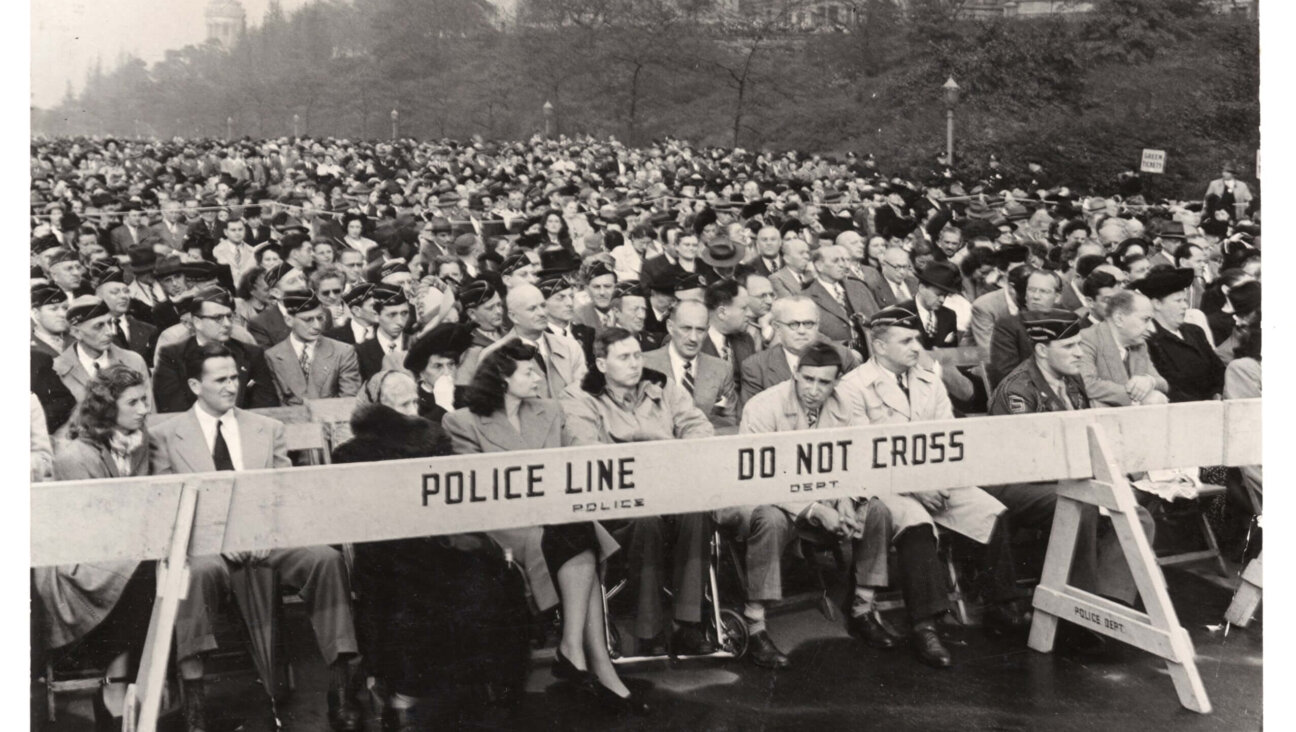What Makes Ari Run
Ari Gold, the smarmy 10-percenter who pulls the strings of HBO’s Hollywood send-up “Entourage,” has it all: degrees from Harvard and Michigan Law, a former-actress wife, a $3 million house in one of the hillier enclaves of West Los Angeles, a full head of hair and a conveniently malleable sense of ethics. He is the very model of Jewish success, in a business built on Jewish success. As his assistant tells him near the end of the show’s second season, “I know the end game, Ari, and you are it.”
But the same qualities that make Ari successful — wile, wit and outright aggression — also make him a schmuck. Like Sammy Glick, the protagonist of Budd Schulberg’s 1940s industry novel “What Makes Sammy Run?” Ari understands that in the movie business, “going through life with a conscience is like driving your car with the brakes on” (and Jeremy Piven plays him with frenetic glee, zooming along like a guy who’s late for his tee time at Hillcrest).
We never see Ari doing anything genuinely evil, but we never see him do anything, it seems, without leaving a coat of slime on every surface. He orders his Chinese assistant to hurry by shouting, “Chop suey, Lloyd!” and apologizes by offering to “hug it out”; he tells Jessica Alba, “Don’t think, it’s bad for your complexion.”
When “Entourage” launched, in the summer of 2004, Ari was the insider foil to the show’s intended stars: an arriviste actor, Vincent Chase, and his crew of friends from Queens. They’re having more fun than Ari is; while he’s screaming into his cell phone, they’re bouncing long drives from their hillside patio off their famous neighbors’ roofs and cruising the nightclub circuit. But as far as Ari is concerned, they’re having their fun at his expense. Ari threatens Eric, Vincent’s best friend and self-declared manager, with having to go back to “slinging dough” at Sbarro if Vincent doesn’t do what he needs to do to stay on the A-list.
For the whole first season, this works in Ari’s favor. But early in the second season, after Ari fails to score U2 tickets for his boys, a member of Vincent’s entourage
informs him, “Jesus Christ, Ari Gold, you just got demoted to silver.” By the end of it, he’s been ousted from the agency and betrayed by a younger agent — a smarmier, smoother, taller version of Ari — who tells him, “You should be a nicer person.”
Yet, moments after his showdown with his vicious senior partner, Ari is back, screaming into a parking garage intercom for Ernesto, the attendant, to bring out his repossessed company car: “How many pesos did I give you for Christmas? Every Christmas, for the last decade! Half of Mexico is eating on my tips that I have given you, so now, bring my car around!”
“I’m sorry, Mr. Gold, I can’t do it,” comes Ernesto’s cool reply. “Oh, and Mr. Gold? I come from Guatemala, and our currency is the quetzal.”
Suddenly, Ari’s bluster looks just like what it is: arrogance covering for that old Jewish man’s classic, paranoid insecurity. It’s the flip side of Larry David’s neurotic self-absorption; Ari is mean because it makes him look important and, more to the point, because it makes him feel important. For Ari, that’s the endgame.
As fallen super-agent Michael Ovitz told Lynn Hirschberg in 1999, “I didn’t, and don’t, think I’m capable of writing or directing, and I’m too self-conscious to act. I don’t have those talents.” Agents, he said, “were cool and smart as hell, and they were in touch with creative people. Once I got into the mailroom, all bets were off. I worked 17, 18 hours a day. I was like a rocket.” That’s Ari. And against him is Vincent — loose limbed, good looking, charming and charmed — who tells Ari, “Don’t forget, I came from nothing, and as much as I love all the toys, I don’t need them.” But Ari does need them. And “Mrs. Ari” needs her art lessons and her charity events and her weekends in Napa, and his kids need bat mitzvahs at the Beverly Hilton.
Just a generation or two removed from the Lastfogels, Wassermans and Mayers who traded selling shmattes for selling talent, Ari Gold isn’t driven by the fear of ending up back with his pop on Seventh Avenue. He doesn’t have a Seventh Avenue to go back to. What makes Ari run — along with the legions of Adams and Brads and Joshes who work the phones all over Beverly Hills’ Golden Triangle — is the fear of ending up like Ovitz: Once the “Most Powerful Man in Hollywood,” he was recently re-titled by the gossip blog Defamer the “Most Powerful Man in Line at Starbucks, If He Avoids the One in Brentwood.” And so, after he’s stripped of his Rolodex, his corner office and his company phone, Ari can’t stop running — even though he has to do it from a corner table at the Brentwood Coffee Bean & Tea Leaf.

I hope you appreciated this article. Before you go, I’d like to ask you to please support the Forward’s award-winning journalism this Passover.
In this age of misinformation, our work is needed like never before. We report on the news that matters most to American Jews, driven by truth, not ideology.
At a time when newsrooms are closing or cutting back, the Forward has removed its paywall. That means for the first time in our 126-year history, Forward journalism is free to everyone, everywhere. With an ongoing war, rising antisemitism, and a flood of disinformation that may affect the upcoming election, we believe that free and open access to Jewish journalism is imperative.
Readers like you make it all possible. Right now, we’re in the middle of our Passover Pledge Drive and we need 500 people to step up and make a gift to sustain our trustworthy, independent journalism.
Make a gift of any size and become a Forward member today. You’ll support our mission to tell the American Jewish story fully and fairly.
— Rachel Fishman Feddersen, Publisher and CEO
Join our mission to tell the Jewish story fully and fairly.
Our Goal: 500 gifts during our Passover Pledge Drive!
























